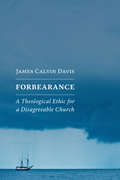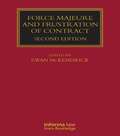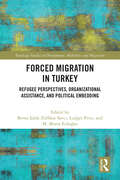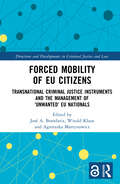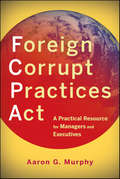- Table View
- List View
Forbearance: A Theological Ethic for a Disagreeable Church
by James Calvin DavisOffers a faithful, constructive way to deal with dissent What happens when we approach disagreement not as a problem to solve but as an opportunity to practice Christian virtue? In this book James Calvin Davis reclaims the biblical concept of forbearance to develop a theological ethic for faithful disagreement. Pointing to Ephesians and Colossians, in which Paul challenged his readers to "bear with each other" in spite of differences, Davis draws out a theologically grounded practice in which Christians work hard to maintain unity while still taking seriously matters on which they disagree. The practice of forbearance, Davis argues, offers Christians a dignified, graceful, and constructive way to deal with conflict. Forbearance can also strengthen the church's public witness, offering an antidote to the pervasive divisiveness present in contemporary culture.
Forbidden Fruit: The Ethics of Secularism
by Paul KurtzAn appropriate challenge to current trends in religion and politics. -Booklist (review of first edition)Paul Kurtz, America's leading secular humanist philosopher, affirms that it is possible to live the good life and be morally responsible, without belief in religion. In this original and penetrating book, Kurtz delineates the means by which humanity can transcend the limitations of traditional religious loyalties and achieve a higher stage of ethics. Fundamentalists deny the possibility of ethics without belief in God. Conservatives rail against secularists. Yet belief in God is no guarantee of moral virtue - as the evils committed in the name of religion have vividly shown. Are there secular ethical principles and values that are vital for a world in crisis?In this new edition of Forbidden Fruit, Kurtz defends the ethics of secularism and humanism. In order to progress to a maximum level of creative development, he maintains that we must be nourished by the forbidden fruit of the knowledge of good and evil, grounding principles and values in autonomous reason. This is the path that leads to the discovery of significant ethical truths that can guide both self-reliant conduct and consideration for the rights of others. By breaking the bonds of theistic illusion, we can summon the courage and wisdom to develop a rational ethic based on a realistic appraisal of nature and an awareness of the centrality of the moral decencies common to all peoples. The ultimate key to the good life, Kurtz writes, is to eat of the fruit of the second tree in the Garden of Eden - the tree of life - discovering for ourselves the manifold potentialities for a bountiful existance. Forbidden Fruit contains important chapters on ethical excellences for individuals, moral education for children, and thoughts on privacy and human rights, in addition to presenting concrete ethical recommendations as alternatives to the reigning orthodoxies. Paul Kurtz, professor emeritus of philosophy at the State University of New York at Buffalo and a fellow of the American Association for the Advancement of Science, is the author or editor of forty-eight books, including The Transcendental Temptation, The Courage to Become, Embracing the Power of Humanism, plus nine hundred articles and reviews. In addition, he is the founder of the Center for Inquiry/Transnational, the Council for Secular Humanism, and the Committee for Skeptical Inquiry. He has appeared on many major TV and radio talk shows, such as Larry King Live, The Oprah Winfrey Show, Good Morning America, Today, and NPR programs. He has lectured at universities worldwide and his books have been translated into many languages.
Forbidden Intimacies: Polygamies at the Limits of Western Tolerance (Globalization in Everyday Life)
by Melanie HeathA poignant account of everyday polygamy and what its regulation reveals about who is viewed as an "Other" In the past thirty years, polygamy has become a flashpoint of conflict as Western governments attempt to regulate certain cultural and religious practices that challenge seemingly central principles of family and justice. In Forbidden Intimacies, Melanie Heath comparatively investigates the regulation of polygamy in the United States, Canada, France, and Mayotte. Drawing on a wealth of ethnographic and archival sources, Heath uncovers the ways in which intimacies framed as "other" and "offensive" serve to define the very limits of Western tolerance. These regulation efforts, counterintuitively, allow the flourishing of polygamies on the ground. The case studies illustrate a continuum of justice, in which some groups, like white fundamentalist Mormons in the U.S., organize to fight against the prohibition of their families' existence, whereas African migrants in France face racialized discrimination in addition to rigid migration policies. The matrix of legal and social contexts, informed by gender, race, sexuality, and class, shapes the everyday experiences of these relationships. Heath uses the term "labyrinthine love" to conceptualize the complex ways individuals negotiate different kinds of relationships, ranging from romantic to coercive. What unites these families is the secrecy in which they must operate. As government intervention erodes their abilities to secure housing, welfare, work, and even protection from abuse, Heath exposes the huge variety of intimacies, and the power they hold to challenge heteronormative, Western ideals of love.
Force Majeure and Frustration of Contract (Lloyd's Commercial Law Library)
by Ewan McKendrickThis updated edition includes an examination of force majeure in French law, the drafting of force majeure clauses, its usage in shipbuilding contracts, and the application of commercial impracticality under article 2-165 of the Uniform Commercial Code.
Force Majeure and the Law: Acts of God in Comparative and Historical Perspective
by Thomas D. MusgraveThis book examines how the Roman, French and English legal systems have each dealt with the issue of unforeseen, supervening events which have rendered the performance of contractual obligations either impossible or fundamentally different in nature, sometimes known as Force Majeure or Acts of God. Although the Roman, French and English laws of contract have each developed legal rules which address this issue, the approach adopted by each system is significantly different from that of the others. The thesis of this book is that the response of a legal system to unforeseen, supervening events derives primarily from the nature and structure of that legal system as a whole, and then, within that broader context, from the salient characteristics of that system’s particular law of contract. The work compares the differing nature and structure of the Roman, French and English legal systems, and their respective laws of contract, in order to demonstrate how this is so.The book will be a valuable guide for academics and researchers working in the areas of Comparative Law, Legal History, Legal Theory and Contract Law. As the English approach to unforeseen, supervening events is very different from that of the French, the book will be of benefit both to English and to French practitioners as they seek to understand how supervening events are dealt with across the Channel. It will also appeal to law students as a guide for studying comparative law.
Force Majeure in the Hydropower Industry: Concepts and Case Studies
by Daniel Constantin DiaconuThis book aims to highlight the particular situation faced by certain hydropower companies by the fact that they cannot fulfil their contracts due to force majeure. The first part of this book will be an analysis of how water is used in electricity production. It is important to point out that all types of energy sources use water, to a different extent, of course, and that its spatial and temporal availability is very important. The focus will be on hydropower, presenting the current situation at the global level, and the effect of reducing the amounts of water in the river system.The second part is based on the presentation of the concept of force majeure and the ways of presenting and drafting it in a contract. Many disputes or the success of a contract depended heavily on the provisions of this article of the contract. Obviously, there are also situations in which the signatory parties abuse or are not protected by these provisions of force majeure. Starting from a few brief examples from the international level, we reach a wide discussion of the situation created in Romania, when the largest supplier of electricity produced on the basis of water terminates several contracts invoking force majeure. The manner in which the opinion of the parties involved is presented to the court is analyzed and presented in detail.
Forced Confessions (Benson and De Vere)
by John FairfaxWilliam Benson. Criminal barrister. Convicted murderer....Convicted of murder sixteen years ago, William Benson is ostracised by the establishment and his family. Supported by a close-knit group including solicitor Tess de Vere, he's defied them all and opened his own Chambers. Now he faces the case of his life - and the terminal illness of Helen Camberley who helped him leave his prison life behind Jorge Menderez, a doctor from Spain, has been found dead in a deserted warehouse in East London. A troubled man, he'd turned to counsellor Karen Lynwood seeking help. Now Karen's husband, John, is accused of his murder. Who is Menderez, and why did he come to London? Benson is defending the couple against seemingly impossible odds, while secrets from his own past threaten to overwhelm him...Praise for Summary Justice and Blind Defence'Assured storytelling and highly intriguing moral complexity. I tore through it' Chris Brookmyre'The courtroom scenes are brilliant, and Benson really comes alive under pressure. Stubborn, fitful and contradictory, he's a highly individualised creation' Spectator'Punchy dialogue and devious plotlines . . . compelling' The Times
Forced Confessions: SHORTLISTED FOR THE CWA GOLD DAGGER AWARD (Benson and De Vere)
by John FairfaxWilliam Benson. Criminal barrister. Convicted murderer....Convicted of murder sixteen years ago, William Benson is ostracised by the establishment and his family. Supported by a close-knit group including solicitor Tess de Vere, he's defied them all and opened his own Chambers. Now he faces the case of his life - and the terminal illness of Helen Camberley who helped him leave his prison life behind Jorge Menderez, a doctor from Spain, has been found dead in a deserted warehouse in East London. A troubled man, he'd turned to counsellor Karen Lynwood seeking help. Now Karen's husband, John, is accused of his murder. Who is Menderez, and why did he come to London? Benson is defending the couple against seemingly impossible odds, while secrets from his own past threaten to overwhelm him...Praise for Summary Justice and Blind Defence'Assured storytelling and highly intriguing moral complexity. I tore through it' Chris Brookmyre'The courtroom scenes are brilliant, and Benson really comes alive under pressure. Stubborn, fitful and contradictory, he's a highly individualised creation' Spectator'Punchy dialogue and devious plotlines . . . compelling' The Times
Forced Confessions: SHORTLISTED FOR THE CWA GOLD DAGGER AWARD (Benson and De Vere)
by John FairfaxWilliam Benson. Criminal barrister. Convicted murderer....Convicted of murder sixteen years ago, William Benson is ostracised by the establishment and his family. Supported by a close-knit group including solicitor Tess de Vere, he's defied them all and opened his own Chambers. Now he faces the case of his life - and the terminal illness of Helen Camberley who helped him leave his prison life behind Jorge Menderez, a doctor from Spain, has been found dead in a deserted warehouse in East London. A troubled man, he'd turned to counsellor Karen Lynwood seeking help. Now Karen's husband, John, is accused of his murder. Who is Menderez, and why did he come to London? Benson is defending the couple against seemingly impossible odds, while secrets from his own past threaten to overwhelm him...Praise for Summary Justice and Blind Defence'Assured storytelling and highly intriguing moral complexity. I tore through it' Chris Brookmyre'The courtroom scenes are brilliant, and Benson really comes alive under pressure. Stubborn, fitful and contradictory, he's a highly individualised creation' Spectator'Punchy dialogue and devious plotlines . . . compelling' The Times
Forced Federalism: Contemporary Challenges to Indigenous Nationhood (American Indian Law and Policy Series Volume #3)
by Jeff Corntassel Richard C. WitmerOver the past twenty years, American Indian policy has shifted from self-determination to “forced federalism,” as indigenous nations in the United States have encountered new threats from state and local governments over such issues as taxation, gaming, and homeland security. During the forced federalism era (1988–present), public perceptions of indigenous peoples as “rich Indians” have been just as damaging to Native nations as anti-sovereignty legislation. This book examines how state governments have manipulated “rich Indian” images when setting policies targeting indigenous peoples and discusses how indigenous nations have responded politically to these contemporary threats to their nationhood. Drawing on original survey data collected from Native governments from 1994 to 2000 and on interviews with Chief Chad Smith of the Cherokee Nation as well as other indigenous leaders, Jeff Corntassel and Richard C. Witmer II examine the power dynamics of the indigenous-state compacting system, and show how electoral activism among indigenous peoples has increased their political power while also giving rise to “rich Indian racism” among non-Indians—especially in the wake of the Indian Gaming and Regulatory Act. The authors warn that current widespread Native participation in non-Native politics is undermining both the political and the cultural foundations of indigenous nationhood, especially as the American culture of money gains influence in Native politics. They also offer specific strategies for regenerating indigenous communities in order to meet future challenges to their nationhood.
Forced Marriage and 'Honour' Killings in Britain: Private Lives, Community Crimes and Public Policy Perspectives
by Christina JuliosThis book explores the contemporary phenomenon of forced marriage and 'honour' killings in Britain. Set against a background of increasing 'honour'-based violence within the country's South Asian and Muslim Diasporas, the book traces the development of the 'honour' question over the past two decades. It accordingly witnesses unprecedented changes in public awareness and government policy including ground-breaking 'honour'-specific legislation and the criminalisation of forced marriage. All of which makes Britain an important context for the study of this now indigenous and self-perpetuating social problem. In considering the scale of the challenge and its underlying causes, attention is paid to the intersections of gendered power structures that disadvantage female members of 'honour' cultures as well as feminist theories that seek to explain them. The book features five key case-studies of 'honour' killings and draws from a wide range of narratives including those of 'honour' violence survivors, grassroots service providers and legislators. Such myriad of perspectives reveals the complexity of the 'honour' issue and the deep ideological divisions that characterise it. With the UK's multiculturalist discourse unable to reconcile protecting patriarchal minority cultures with safeguarding gender equality and human rights, the book raises fundamental questions about the country's future direction. Following a long trend of state-sponsored integrationist policies, the government's response to the 'honour' question points decisively in the direction of a post-multicultural British nation.
Forced Migration in Turkey: Refugee Perspectives, Organizational Assistance, and Political Embedding (Routledge Studies in Development, Mobilities and Migration)
by Ludger Pries Şafak Zülfikar Savcı, Berna M. Murat ErdoğanTurkey hosts more refugees than any other country in the world, with forced migrants from Syria, Afghanistan, Pakistan, Iraq, and other countries converging, either with hopes to settle in Turkey or to continue onwards to the European Union (EU).This volume addresses the specific experiences and trajectories of forced migrants in Turkey in the context of local and national contexts and the future of EU-Turkey relations. It presents the demographics of forced migrants, the biographies and future plans of refugees, and their interactions with civil society, states, and international agencies. A focus is on organized violence and corresponding experiences in countries of origin, during transit, and at current places.Based on extensive quantitative and qualitative research, this book will be of interest to researchers and practitioners in the fields of migration, human security, and refugee studies, as well as of sociology, political sciences, and international relations.
Forced Mobility of EU Citizens: Transnational Criminal Justice Instruments and the Management of 'Unwanted' EU Nationals (Directions And Developments In Criminal Justice And Law Ser.)
by Witold Klaus José A. Brandariz Agnieszka MartynowiczForced Mobility of EU Citizens is a critical evaluation from an empirical perspective of existing practices of the use of transnational criminal justice instruments within the European Union. Such instruments include the European Arrest Warrant (EAW), prisoner transfer procedures and criminal law-related deportations. The voices and experiences of people transferred across internal borders of the European Union are brought to the fore in this book. Another area explored is the scope and value of EU citizenship rights in light of cooperation not just between judicial authorities of EU Member States, but criminal justice systems in general, including penitentiary institutions. The novelty of the book lays not only in the fact that it brings to the fore a topic that so far has been under-researched, but it also brings together academics and studies from different parts of Europe – from the west (i.e. the expelling countries) and the east (the receiving countries, with a special focus on two of the jurisdictions most affected by these processes – Poland and Romania). It therefore exposes processes that have so far been hidden, shows the links between sending and receiving countries, and elaborates on the harms caused by those instruments and the very idea of ‘justice’ behind them. This book also introduces a new element to deportation studies as it links to them the institution of the European Arrest Warrant and EU law transfers targeting prisoners and sentenced individuals. With a combination of legal, criminological, and sociological perspectives, this book will be of great interest to scholars and students with an interest in EU law, criminal law, transnational criminal justice, migration/immigration, and citizenship.
Forced Out: A Detective's Story of Prejudice and Resilience
by Kevin MaxwellA gay, black, British police officer&’s memoir of prejudice, racism and homophobia on the force in the twenty-first century.Kevin Maxwell was a dream candidate for the police force—he had a long-held desire to serve his community, a strong moral compass and a clear aptitude for both the strategic and practical aspects of policing. And, as a gay black man from a working-class family, he could easily have been a poster boy for the force&’s stated commitment to equal opportunities. Joining just after the 9/11 attacks, Kevin entered policing determined to keep communities safe in the face of a changing world. But instead, he came up against entrenched prejudice, open racism and homophobia. For more than ten years, Kevin strove against the odds, until he took the force to an employment tribunal—with devastating results.Forced Out is a revelatory exposé combining deeply affecting memoir with sharp analysis and a fascinating insider perspective on day-to-day life in the force. It is a touchstone for the silent many who have either tried to ignore abuse for the sake of their career or who have been bullied out of their jobs. It paints a sobering portrait of an institution that has not yet learned the lessons of the past and whose prejudice is informing the cases it chooses to investigate and the way it investigates them. And it asks the important question: what needs to change?&“One of the most compulsive books I&’ve read in a long while.&” –Bernadine Evaristo, award-winning author of Girl, Woman, Other
Forced Out: Migrant Mothers in Search of Refuge and Hope
by Susan J. TerrioFeatures the stories of undocumented mothers who reunite with their children in the US years after fleeing violence at homeFacing escalating chaos and violence in their home countries, many Central American mothers have found that a desperate flight to the north was their only choice. Many left their children behind in order to spare them the hardships of the journey. If they made it across the border without getting locked up or deported, they entered a country increasingly unwilling to recognize claims of asylum.This book features the stories of women who crossed the border without encountering immigration authorities, in some cases several times, and settled in the greater Washington, DC, area, living in the shadows for years. By centering on the voices of the women themselves, it offers an intimate look at what drove them from home and the challenges they face in reuniting years later with their children.Forced Out traces the women’s evolving attitudes toward the violence embedded in institutions and everyday life in their home countries, as well as their continued vulnerability and dependence in the US. It also highlights the challenges they face in parenting children adapting to American society and learning English while living with mothers who had left them years before and become strangers to them. Rather than sensationalizing their trauma or dwelling on their vulnerability, the stories reveal the women’s rich, complex inner lives, their resilience in overcoming senseless violence, and their unswerving commitment to bettering their children’s lives. Clear, vivid, and impactful, this is a humbling and humane look at the state of migration to America today.
Forced Sexual Intercourse in Intimate Relationships (Routledge Revivals)
by Ida M. Johnson Robert T. SiglerPublished in 1997. Literature is reviewed relating to those behaviours which have traditionally been referenced as date rape, acquaintance rape, or rape by a friend or someone known to the victim. Forced sexual intercourse in intimate relationships is placed in both an historical context and a conceptual context. Limited published and unpublished data from the authors research are included in appropriate chapters. The theory chapter ends with the presentation of a rudimentary model for examining forced sexual intercourse in intimate relationships developed by the authors. The topics of domestic violence, courtship violence and forced sexual intercourse are highly controversial and tend to be dominated by those who are promoting specific political agendas. Much of the work in this field has been written from the 'feminist' perspective with recent works appearing which oppose the feminist perspective. This work is neither 'feminist' nor anti-feminist in its approach. It is analytical and, as much as possible in a politized environment, analytical and neutral.
Forces for Good?
by Claire DuncansonThis book utilises the growing phenomenon of British soldier narratives from Iraq and Afghanistan to explore how British soldiers make sense of their role on these complex, multi-dimensional operations. It aims to intervene in the debates within critical feminist scholarship over whether soldiers can ever be agents of peace.
Forces of Labor: Workers' Movements and Globalization Since 1870 (Cambridge Studies in Comparative Politics)
by Beverly J. SilverRecasting labor studies in a long-term and global framework, the book draws on a major new database on world labor unrest to show how local labor movements have been related to world-scale political, economic, and social processes since the late nineteenth century. Through an in-depth empirical analysis of select global industries, the book demonstrates how the main locations of labor unrest have shifted from country to country together with shifts in the geographical location of production. It shows how the main sites of labor unrest have shifted over time together with the rise or decline of new leading sectors of capitalist development and demonstrates that labor movements have been deeply embedded (as both cause and effect) in world political dynamics. ,p>Over the history of the modern labor movement, the book isolates what is truly novel about the contemporary global crisis of labor movements. Arguing against the view that this is a terminal crisis, the book concludes by exploring the likely forms that emergent labor movements will take in the twenty-first century.
Ford County: Stories
by John Grisham#1 NEW YORK TIMES BESTSELLER • In his first collection of short stories John Grisham takes us back to Ford County, Mississippi, the setting of his first novel, A Time to Kill.This riveting collection of short stories features an unforgettable cast of characters: Wheelchair-bound Inez Graney and her two older sons embark on a bizarre road trip through the Mississippi Delta to visit Inez&’s youngest son, Raymond—on death row. A hard-drinking, low-grossing divorce lawyer fed up with his wife, his life, and the law plans a drastic escape after an unexpected phone call. A quiet, unassuming data collector sets out to bring down a flashy casino owner with his skill at blackjack—as payback for the theft of his wife. A stalker hunts victims in a retirement home, a lawyer confronts a vengeful adversary from the past, and a young man from a prominent family is driven off by scandal and fear—but finds unexpected redemption on the wrong side of the tracks. Often hilarious, frequently moving, and always entertaining, this collection makes it abundantly clear why John Grisham is our most popular storyteller.Don&’t miss John Grisham&’s new book, THE EXCHANGE: AFTER THE FIRM!
Ford's The Modern Theologians: An Introduction to Christian Theology since 1918 (The Great Theologians)
by David F. FordCaptures the multiple voices of Christian theology in a diverse and interconnected world through in-depth studies of representative figures and overviews of key movements Providing an unparalleled overview of the subject, The Modern Theologians provides an indispensable guide to the diverse approaches and perspectives within Christian theology from the early twentieth century to the present. Each chapter is written by a leading scholar and explores the development and trajectory of modern theology while presenting critical accounts of a broad range of relevant topics and representative thinkers. The fourth edition of The Modern Theologians is fully updated to provide readers with a clear picture of the broad spectrum and core concerns of modern Christian theology worldwide. It offers new perspectives on key twentieth-century figures and movements from different geographical and ecclesial contexts. There are expanded sections on theological dialogue with non-Christian traditions, and on Christian theology's engagement with the arts and sciences. A new section explores theological responses to urgent global challenges - such as nationalism, racism, and the environmental crisis. Providing the next generation of theologians with the tools needed to take theological conversations forward, The Modern Theologians: Explores Christian theology's engagement with multiple ways of knowing across diverse approaches and traditions Combines introductions to key modern theologians and coverage of the major movements within contemporary theology Identifies common dynamics found across theologies to enable cross-contextual comparisons Positions individual theologians in geographical regions, trans-local movements, and ecclesial contexts Features new and revised chapters written by experts in particular movements, topics, and individuals Providing in-depth critical evaluation and extensive references to further readings and research, Ford's The Modern Theologians: An Introduction to Christian Theology since 1918, Fourth Edition, remains an ideal textbook for undergraduate and graduate courses in Theology and Religious Studies, such as Introduction to Christian Theology, Systematic Theology, Modern Theology, and Modern Theologians. It is also an invaluable resource for researchers, those involved in various forms of Christian ministry, teachers of religious studies, and general readers engaged in independent study.
Foreclosed: Mortgage Servicing and the Hidden Architecture of Homeownership in America
by Christopher K. OdinetIn Foreclosed, Christopher K. Odinet gives voice to the stories of homeowners that have been neglected, particularly those facing foreclosure and deep financial distress. The book reveals the powerful and often invisible mortgage servicing industry, the tremendous discretionary power it wields over the housing lives of most Americans, and the servicing problems that still persist today. In doing so, it unveils a quiet and dangerous market shift in mortgage servicing - namely, an ongoing move toward a shadow banking sector where regulation is weak - that threatens the stability of our housing finance system. Ultimately, the book demonstrates how the law does not afford homeowners the protection most think and how regulation of these mortgage middlemen remains weak. Foreclosed should be read by anyone concerned with the state of housing and home ownership in the United States.
Foreclosure Survival Guide, The: Keep Your House or Walk Away With Money in Your Pocket
by Amy LoftsgordonIf you're one of the millions Americans who are having trouble making your mortgage payments or are already in danger of foreclosure, this guide will give you the practical information you need, including: the ins and outs of foreclosure how to decide if you should try to keep your house federal programs to help you avoid foreclosure alternatives to foreclosure, such as short sales and deeds in lieu delaying or avoiding foreclosure with bankruptcy, and avoiding foreclosure scams. This edition of the nation's bestselling book on foreclosure is updated with the latest information on the federal Making Home Affordable programs, federal mortgage servicing rules, recent court decisions affecting homeowner?s rights, and state foreclosure procedures and timelines.
Foreclosure Survival Guide, The: Keep Your House or Walk Away With Money in Your Pocket
by Amy LoftsgordonIf you're having trouble making your mortgage payments or are already in danger of foreclosure, this guide will give you the practical information you need, including: the ins and outs of foreclosure how to decide if you should try to keep your house programs to help you avoid foreclosure alternatives to foreclosure, such as short sales and deeds in lieu delaying or avoiding foreclosure with bankruptcy, and how to avoid becoming the victim of a foreclosure scams. This edition is updated with the latest information on federal mortgage servicing laws, programs to help homeowners avoid foreclosure, relief for victims of natural disasters, recent court decisions affecting homeowners’ rights, and state foreclosure procedures and timelines.
Foreign Agents: How American Lobbyists and Lawmakers Threaten Democracy Around the World
by Casey MichelA stunning investigation and indictment of a segment of the United States' foreign lobbying industry, and the threat to end democracy.For years, one group of Americans has worked as foot-soldiers for the most authoritarian regimes around the planet. In the process, they've not only entrenched dictatorships and spread kleptocratic networks, but they've secretly guided U.S. policy without the rest of America even being aware. And now, some of them have begun turning their sights on American democracy itself.These Americans are known as foreign lobbyists, and many of them spent years ushering dictatorships directly into the halls of Washington, all while laundering the reputations of the most heinous, repressive regimes in the process. These foreign lobbyists include figures like Ivy Lee, the inventor of the public relations industry—a man who whitewashed Mussolini, opened doors to the Soviets, and advised the Nazis on how to sway American audiences. They include people like Paul Manafort, who invented lobbying as we know it—and who then took his talents to autocrats from Ukraine to the Philippines, and then back to the White House. And they now include an increasing number of Americans elsewhere: in law firms and consultancies, among PR specialists and former lawmakers, and even within think tanks and universities.In Foreign Agents, Casey Michel shines a light on these foreign lobbyists as some of them—after decades of installing dictators and corrupting American policy—embark on their next mission: to end America’s democratic experiment, once and for all.
Foreign Corrupt Practices Act
by Aaron G. MurphyA thoroughly pragmatic guide to the U. S. Foreign Corrupt Practices Act (FCPA) This is a critical FCPA training resource for executives, managers, sales, marketing, finance and accounting personnel, as well as high level professionals. The ideal resource for any business that takes FCPA compliance seriously and truly desires to foster a deep understanding of real-world corruption issues in their employees A great resource for business school courses on international business or business ethics and anyone interested in understanding these issues for their own professional growth Includes in-depth analysis of all major FCPA risk areas, including discussions of how FCPA issues arise in real-world business situations Covers all aspects of bribery and FCPA compliance issues to ensure that your business is not exposing itself to financial scandal or criminal prosecution FCPA compliance is mandatory for nearly all international businesses operating in today's global economy. This book serves as the perfect training tool to mitigate your organization's risk to FCPA violations, which is one of the top enforcement priorities for the Department of Justice (DOJ) and the Securities and Exchange Commission (SEC).
